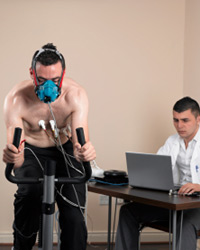Exercise Helps Reduce Anxiety During Stressful Events

A new study by Maryland University researchers has suggested that exercise or physical training may help reduce anxiety when being confronted with stressful or emotional events.
 Previous studies have conclusively demonstrated a link between exercise and positive mood, however it wasn’t clear whether these effects endure when we are faced with everyday stressors, outside the gym.
Previous studies have conclusively demonstrated a link between exercise and positive mood, however it wasn’t clear whether these effects endure when we are faced with everyday stressors, outside the gym.
More recent research, soon to be published in the journal Medicine and Science in Sports and Exercise, found that exercise helps to buffer the effect of emotional exposure. Furthermore, exercise not only reduces anxiety but helps maintain that reduced anxiety when confronted with emotional events.
J. Carson Smith, assistant professor in the Department of Kinesiology compared how moderate intensity cycling for 30 minutes and a 30 minute period of quite rest affected anxiety levels in a group of healthy college students.
Anxiety levels were assessed using 20 questions from the State Trait Anxiety inventory before activity, 15 minutes post activity and finally after exposure to a variety of pleasant, neutral and distressing images.
All participants were put through both the exercise and the rest states (on different days) and tested for anxiety levels pre-exercise, post-exercise, and post-picture viewing.
Smith found that both quiet rest and physical activity were effective at reducing levels of anxiety. However exercise showed a prolonged effect. Anxiety levels following exercise remained low, even after emotional stimulation using the images. Anxiety levels following the rest period went back to initial levels immediately after viewing the emtionally charged images.
The study findings suggest that exercise may play an important role in helping people to better endure life's daily anxieties and stressors.
Smith plans to explore if exercise could have the same persistent beneficial effect in patients who regularly experience anxiety and depression symptoms.
Exercise and Stress Induced Aging
Other research from UCSF has also shown that regular physical training can also buffer the effects of stress-induced cell aging.(1)
During the study the researchers found that even brief bursts of activity can protect against the effects of stress by reducing its impact on telomere length. Telomeres are small pieces of DNA that maintain genetic stability by keeping chromosomes from unravelling, in a very similar way to plastic shoe lace ends.
The findings of the UCSF study build on a growing body of research documenting how on-going psychological stress affects the body, aging and the development of various diseases.
References




